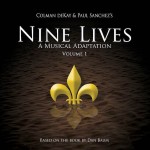Nine Lives is an attempt by Paul Sanchez and screenwriter Colman DeKay to adapt Dan Baum’s account of the lives of nine New Orleanians for a musical. Knowing that doesn’t prepare you for what a musical it is, though. You expect music by an established musician to have some signature, but that’s not the case here. Though Sanchez is known for his songwriting, his collaboration with DeKay erases most of his fingerprints, and because a sound or style has been associated with each of the characters, there’s little musical to mark Nine Lives as the work of anyone in particular. That’s not a bad thing; in fact, the absence of artistic signatures makes it easier to focus on the music and the drama it’s telling.
Equally impressive is that more than 100 area musicians were involved in the making of the album, but you can’t tell. Matt Perrine was the principal arranger, and he gives each song a New Orleans voice that the musicians inhabit, which is a testament to their professionalism that they subsumed themselves to the project’s identity. Piety Street Recording’s Mark Bingham helped unify the tracks, which include piano ballads, Indian chants, marching band music and baroque chamber music, by playing them back into the main studio, where he re-captured them on a series of mics to simulate the experience of hearing Nine Lives in a theater.
Having read Nine Lives, I had no problem seeing how the songs fit into Baum’s story, but I wonder where I’d be without that knowledge. You can make sense of the incidents dramatized easily enough, but do the songs also advance our understanding of the characters? I’m not sure. Sanchez and DeKay’s take on Dr. Frank Minyard is clear in “Run Against You and Win,” and they capture Wilbert Rawlins, Jr.’s sense of purpose as a high school band director in his songs. On the other hand, they’re not as successful with John—who becomes JoAnn—Guidos. “Now That Kathy’s Gone” is smart and covers a lot of plot, but you don’t get any sense of Guidos from the song. Perhaps that’s understandable; the novelty of dramatizing that story is such that it’s easy to lose sight of what’s important (Guidos’ triumphant self-realization song, similarly, is wittily disco, but it’s also generic disco). This could also be a product of respect. Sanchez and DeKay adhere faithfully to Baum’s writing, borrowing phrases and bits of language from his text. That helps make two discs-worth of songs separate themselves, but taking greater ownership of the story might have made it easier to convey character in song.
The album comes with notes to help address this issue, but Nine Lives also works on its own as a listening experience, albeit a theatrical one. It opens with “Fine in the Lower Nine,” and John Boutte and Wendell Pierce act their lines as much as sing them, and the album’s vocalists largely follow suit. One of the high points is Irma Thomas’ “It Could Have Been Worse,” whose natural, subtle sense of drama is present in every song she sings, including this one where she plays herself.
Nine Lives closes with “Rebuild Renew,” which typifies everything smart about the project. Considering its theme, it could have easily become another litany of tourist attractions strung together by platitudes, but Sanchez and DeKay resist that temptation. It similarly inches its way toward “We Are the World” territory with a host of voices, including Mayor Mitch Landrieu’s, but it never quite steps in. That made me wonder if it’s rousing enough to be a closer, but the fact that it’s sung by the character who starts the story looking to be anywhere but New Orleans gives it dramatic and thematic power. And that’s the Nine Lives experience in a nutshell—not entirely satisfying because it’s made with another medium in mind, but impressive and more successful than a project with so many possible distractions promises.





